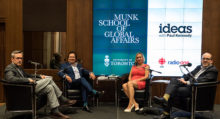How can we build trust between the public and the police at a time of increasingly complex threats to our security? A panel of experts explored this question, and others, in a discussion on the many issues surrounding policing, hosted by Ideas, CBC Radio One and the Munk School of Global Affairs. The panel, moderated by Ron Levi, director of the Munk School’s Global Justice Lab, explored dynamics of trust and public consent as well as the new challenges posed by counterterrorism and cybercrime. Parts one and two of the discussion will be broadcast on Ideas, CBC Radio One on June 15 and 22.
For Inspector Shawna Coxon, who has served for more than two decades with the Toronto Police Service and the Transformational Task Force, trust between the police and the public is a two-way relationship that requires constant re-evaluation on both sides. “Whether or not trust exists is always in the hands of the community,” she explained. “The police are not in a position to say if trust is there; it’s the perspective of the community that matters. But what a community expects is always different depending on the circumstances. It’s a challenge to define those expectations according to the needs and wants of people from varied backgrounds across the country.”
Todd Foglesong, assistant professor at the Munk School, believes transparency and accountability are key elements that build trust in the community – when both sides have an equal say in the conversation and no party is deemed an absolute authority.
According to Donald Worme, a Cree lawyer and founding member of the Indigenous Bar Association of Canada, trust between the police and the public is of particular concern for those from marginalized communities who feel that they are disproportionately subject to racial profiling. Many believe that they are treated differently by the police because of who they are, whether Indigenous people in rural communities or people of colour in urban settings, which puts them all too frequently at a social, economic and cultural disadvantage. From Worme’s perspective, a greater appreciation of the social aspect of policing is crucial in bridging the gap between police forces and community members. Micheal Vonn, a lawyer and Policy Director of the BC Civil Liberties Association, echoed Worme’s sentiment by insisting that police forces must consider the lived experiences of the people they serve. “If we want to create stronger bonds, we must better understand the resilience of people who were past subjected to oppression and violence – it’s a necessity not only to improve the relationship between the police and the public, but also amongst ourselves.”
Additionally, national security concerns are placing higher demand on police. Cal Corley, CEO of the non-profit research and knowledge development centre Community Safety Knowledge Alliance (CKSA) and a former Assistant Commissioner with the Royal Canadian Mounted Police, believes the threats of terrorism and cybercrime in this day and age require a “multilateral, multidisciplinary approach” to police work. “There needs to be a distinction between the needs of national security and those of community-based services. We should take a wider view of what ‘diversity’ means to account for the many differences found within the population.” We must also consider the risks and benefits of these emerging securitization needs, Vonn added. “Privileging national security has a cost, and the preemptive approach has another logic that often comes into open conflict with other important aspects of police work. What price do communities have to pay for this? There’s a big difference between being ‘at risk’ and being ‘the risk.’” Striking a balance between individual and collective rights, between our need to be protected and the particularities and histories of each community, remains the most important task lying before us.
June 15, 2017
Policing, Part One: To Serve or Protect will be broadcast on Ideas, CBC Radio One from 9:05 p.m. to 10 p.m. and 9:35 p.m. in Newfoundland.
